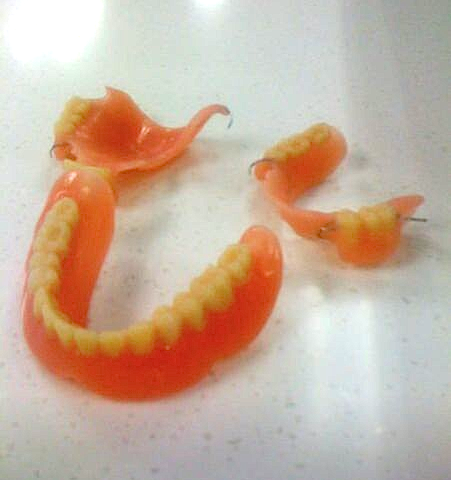What to expect when you have lost all of your teeth?
If you’ve lost all of your natural teeth, whether from gum disease, tooth decay or injury, replacing missing teeth will benefit your appearance and your health. That’s because dentures make it easier to eat and speak better than you could without teeth. Furthermore, loosing all of your teeth may cause facial muscles to sag and making you look older. Dentures can help fill out the appearance of your face and profile. They can be made to closely resemble your natural teeth so that your appearance does not change much. Dentures may even improve the look of your smile.
How dentures are made?
A complete denture will be fitted if all your upper or lower teeth need to be removed or you are having an old complete denture replaced.
The denture is usually fitted as soon as your teeth are removed, which means you won't ever be without teeth. The denture fits snugly over your gums and jawbone.
Occasionally, however, your gums may need to heal for several months before dentures can be fitted.
A dentist will take measurements and impressions (moulds) of your mouth, then order your full or partial dentures from a dental technician. Then a trial denture will be created from the impressions that are taken of your mouth. The dentist will try this in your mouth to assess the fit and for you to assess the appearance. The colour and shape may be adjusted before the final denture is produced.
A new denture wearer-what to expect upon receiving a new complete denture?
New dentures may feel awkward for a few weeks until you become accustomed to them. The dentures may feel loose while the muscles of your cheek and tongue learn to keep them in place. It is not unusual to experience minor irritation or soreness. You may find that saliva flow temporarily increases. As your mouth becomes accustomed to the dentures, these problems should go away. Follow-up appointments with the dentist are generally needed after a denture is inserted so the fit can be checked and adjusted. If any problem persists, particularly irritation or soreness, be sure to consult your dentist.
How to eat with complete denture?
When you first start wearing dentures you should eat soft foods cut into small pieces and chew slowly using both sides of your mouth. Avoid chewing gum and any food that is sticky, hard or sharp-edged. You can gradually start to eat other types of food until you are back to your old diet. Never use toothpicks.
How to maintain your complete denture?
Like your teeth, your dentures should be brushed daily to remove food particles and plaque. Brushing also can help keep the teeth from staining.
Rinse your dentures before brushing to remove any loose food or debris.
Use a soft bristle toothbrush and a non-abrasive cleanser to gently brush all the surfaces of the dentures so they don't get scratched.
When brushing, clean your mouth thoroughly—including your gums, cheeks, roof of your mouth and tongue to remove any plaque. This can help reduce the risk of oral irritation and bad breath.
When you’re not wearing your dentures, put them in a safe place covered in water to keep them from warping.
When to see your dentist?
You should continue to see your dentist regularly if you have dentures, even if you have complete dentures, so they can check for any problems.
Dentures should last for several years if you take good care of them. The average denture usually requires a laboratory reline or remake at least once in every four years, due to functional wear and/or continued bone,which means the dentures may not fit as well as they used to and can become loose, or they may become worn.
You should see your dentist as soon as possible if:
your dentures click when you are talking
your dentures tend to slip, or you feel they no longer fit properly
your dentures feel uncomfortable
your dentures are visibly worn
If poorly fitting or worn dentures are not replaced, they can cause great discomfort and lead to mouth sores, infections or problems with eating and speech.
Article contributed for Dentistsnearby by,
Dr Mohamad Muzafar Hamirudin,
BDS(Mal) MClinDent(Prosth.)(London) DipDCSc((London) MFDSRCS(England) FICD(USA)
Consultant Prosthodontist and Dental Restorative Specialist,
KPJ KL Dental Centre, Tawakkal Health Centre



